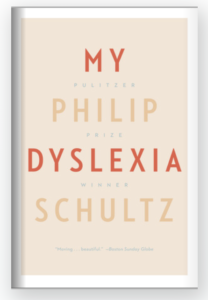“My Dyslexia” – Find it at a Bookstore Near You!
Written by Sandie Barrie Blackley, Speech-Language Pathologist
Published on September 9, 2011
In a previous post, I talked about the importance of movies like “The King’s Speech” in drawing public attention to poorly-understood conditions. We are hopeful that what “The King’s Speech” did for stuttering a major motion picture will someday do for dyslexia.
 Meanwhile, I’m extremely encouraged to see that Pulitzer Prize-winning poet Philip Schultz has written a memoir entitled My Dyslexia, which is scheduled for release this month from W. W. Norton & Company.
Meanwhile, I’m extremely encouraged to see that Pulitzer Prize-winning poet Philip Schultz has written a memoir entitled My Dyslexia, which is scheduled for release this month from W. W. Norton & Company.
Like many adults with dyslexia, Schultz was never diagnosed. He simply struggled through the miseries of school and teasing and slowly taught himself to understand, and eventually master, written language.
Here is the publisher’s description of Schultz’s book:
“Despite winning the Pulitzer Prize for Poetry in 2008, Philip Schultz could never shake the feeling of being exiled to the ‘dummy class’ in school, where he was largely ignored by his teachers and peers and not expected to succeed. Not until many years later, when his oldest son was diagnosed with dyslexia, did Schultz realize that he suffered from the same condition.
“In his moving memoir, Schultz traces his difficult childhood and his new understanding of his early years. In doing so, he shows how a boy who did not learn to read until he was eleven went on to become a prize-winning poet by sheer force of determination….”
I encourage you to listen to a wonderful NPR Talk of the Nation interview with Philip Schultz, “Prize-Winning Poet: Discovering ‘My Dyslexia’ At 58” and you can also read an opinion-page article by Philip Schultz in the Sunday New York Times, “Words Failed, Then Saved Me.”
Schultz’s experience, like that of many people with undiagnosed and untreated dyslexia, is profoundly moving, especially since he now has a writer’s ability to describe his own struggles and triumphs.
If you have a child who struggles with reading, writing, or spelling, the first and most critical step in getting the right help is a professional evaluation. You can read more about diagnosing dyslexia or contact us with your questions at Info@Lexercise.com or 1-919-747-4557.
Improve Your Child’s Reading
Learn more about Lexercise today.
Schedule a FREE
15-minute consultation


